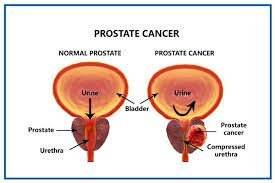One in 11 men will be diagnosed with prostate cancer in their lifetime, making it one of the most prevalent malignancies among males globally.
Prostate cancer affects 1.6 million men annually. And 366,000 men die from prostate cancer each year.
But there is good news, prostate cancer is quite treatable, and more than 98 percent of patients have a five-year survival rate, which means they are 98 percent as likely to live for five years as men who do not have prostate cancer. However, a lot of men with prostate cancer don’t exhibit any symptoms, and those that do are typically subtle.
Urinating more frequently, particularly at night, is the most usually overlooked early indication of prostate cancer. Because many patients simply view it as an indication of aging or feel they’re drinking liquids too close to bedtime, this is frequently ignored.
The most typical sign is having trouble urinating or peeing excessively. Medical experts note that these symptoms are more typical with benign prostate enlargement. In actuality, coincidental prostate enlargement is more likely to be the cause of these symptoms in a patient with prostate cancer than the illness itself. Other typical prostate cancer symptoms include inability to start or stop urinating; pain or burning when urinating; blood in the urine or semen; and erectile dysfunction.
These symptoms are associated with other diseases, just like urinating more frequently or having trouble urinating, so it’s critical to contact a urologist right away if you experience any of them. It’s also necessary to get routine prostate exams.
Prevention techniques
The most crucial action you can do to avoid prostate cancer is to visit the doctor for routine screenings. Prompt screening is the first step in preventing prostate cancer-related death, according to Dr. Miller. Men over the age of 40 should see their physician about when to get a screening PSA blood test depending on your needs and risks.
There are lifestyle changes that can hedge your bets against getting prostate cancer, and they’re generally tried and true in terms of not just prostate cancer, but many other cancers and diseases as well.
Give up smoking.
According to health experts, smoking is a significant risk factor for prostate cancer. The best thing you can do for your health is to stop smoking.
Also, limit alcohol consumption.
Excessive alcohol consumption increases the risk of prostate cancer; men shouldn’t consume more than two drinks a day of alcohol.
Having a healthy weight is paramount. Obesity raises the likelihood of developing prostate cancer as well as many other serious illnesses.
A balanced diet is important. Eating a diet heavy in fruits, vegetables, and whole grains, but limited in red meat and saturated fat matters. Consume plenty of antioxidant-rich fruits and vegetables, which may have cancer-preventing benefits.
Regular exercise, at least 30 minutes of moderate intensity on most days of the week, can help your odds against prostate cancer. Stress reduction can play a factor in overall health, so try to chill out when you can. Getting adequate sleep is essential for overall health, which can factor into cancer prevention.
Is prostate cancer curable?
The majority of the time, yes—but you have to detect it early. When caught early, 98 percent of prostate cancer diagnoses are curable. Once prostate cancer has spread, the cure rate drops precipitously.
Options for treatment differ since each patient is different; these variables can include age, the stage and severity of the disease, and the patient’s general health.
The best course of action, according to doctors, is attentive observation (also known as “active surveillance” or “watchful waiting”) in cases of very early-stage, indolent illness in men. For some patients who have co-morbidities and overall poor health, they can adopt attentive waiting.
Surgery or radiation is recommended for patients with advanced prostate cancer, while hormonal therapy and chemotherapy are good for late-stage prostate cancer patients who have metastasized to other locations, blocking testosterone production to slow cancer growth.



